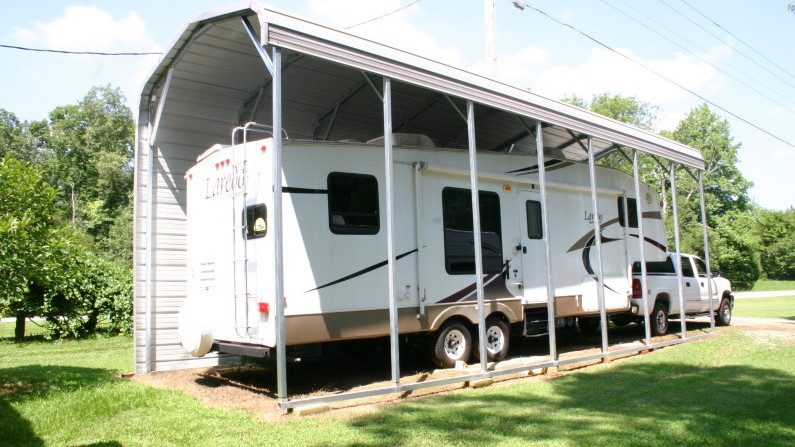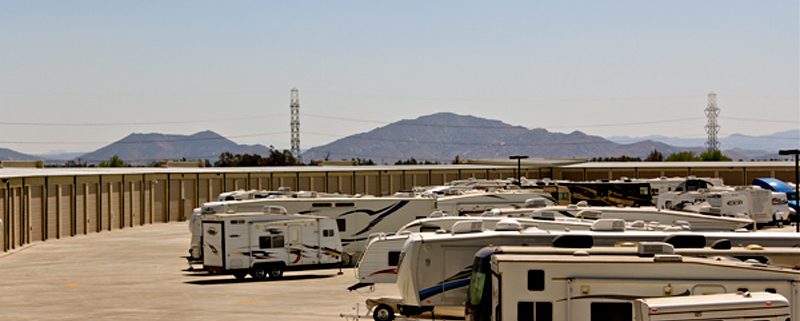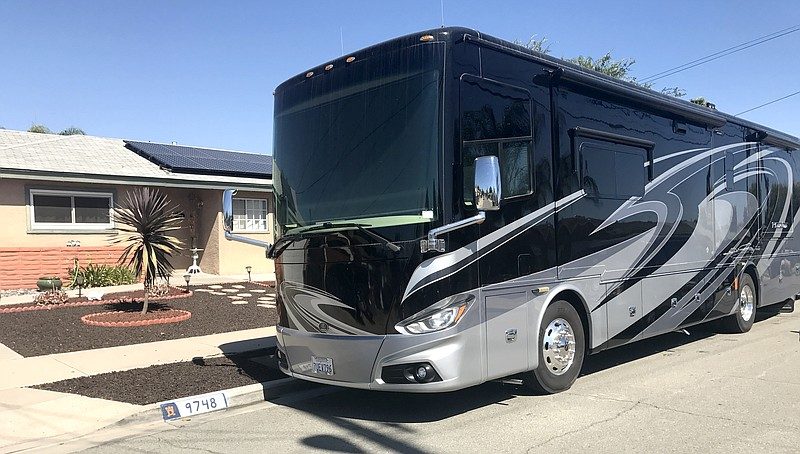RV Storage – How To Store Your Camper, RV, Trailer, Or Bus
RV Storage comes in many different forms. The first thing you need to ask yourself is ‘what is an RV?’ We all know it’s a recreational vehicle, but that could be anything from a self-converted mini camper to a gargantuan fifth-wheel trailer or a truck camper.
One thing is for certain no matter what type of RV you own, you’re going to want to look after it. Whether you’ve just bought a second-hand teardrop trailer or have invested in a new Four Wheel Campers camping pod, you want somewhere to keep it safe, secure, and in good condition for many years to come.
As RVs come in all shapes and sizes, there needs to be a number of different RV storage options available for you and your new purchase. Let’s take a look at them below!
Featured Image Credit: Inside Self-Storage
RV Storage – Parking Your RV At Home

For many of us, the most obvious place to consider for RV storage is our own homes. You can keep an eye on your vehicle, and it’s nearby if you need to do any repairs, cleaning, or maintenance.
Check out our article on cleaning your RV if you need help with your routine!
The problem is that some states are imposing rules about storing large vehicles at your home address. In a way, it’s kind of understandable, especially if you have a Thor A Class Coach sitting on your driveway.
Make sure that you know your city’s laws regarding RV storage before you hand over your cash to the dealer. Vehicles can be towed if you don’t adhere to parking laws, and they change from place to place. Do your research and don’t get stung.
What Equipment Will I Need?
If you do decide to go with home RV storage, then you’ll need to invest in some of the best RV accessories to keep everything clean and secure while your vehicle slumbers.
A good RV cover is great to keep moss, dirt, bird poop, and other natural debris off your tiny home while it’s static. If you have a small camper, then you could even fashion one yourself out of a tarpaulin or by stitching old pieces of tent together.
It’s also a great idea to keep your tyres covered too for the same reasons.
RV Storage Through Winter
When the weather gets cold, it is a good idea to make a ‘winter health check’ for your camper or trailer. If your vehicle has an engine, then flushing lines and filling windscreen wiper channels with the appropriate non-freeze fluid are important tasks to prepare it for hibernation.
Locks can easily freeze over too, something that has happened to me on a number of times while I’ve been living the van life! Make sure they’re covered securely; you could even add extra wadding around lock areas and handles to prevent this from happening.
No matter what size of RV you own, if it has an engine, remember to turn it over every now and then. This will avoid the battery giving up the ghost completely and keep everything in working order.
RV Storage Through Summer
That glass windshield or those bedroom windows can make your camper intolerably hot during the summer. Having window blinds or stick-on shades to regulate the temperature inside your vehicle or trailer is a good idea for hotter climates.
Unless you use your camper as an extra pantry, then it’s also a good idea to disconnect any leisure batteries that you might have hooked up to appliances like your fridge. In hot climates, your fridge will be unnecessarily draining your batteries faster than my girlfriend eats a multipack of crisps (we’re talking supersonic speeds).
Storing Your RV In A Free Parking Zone
If your camper is a Class B Van like a Mercedes Sprinter or a Ram Promaster, then you may opt to store it somewhere that offers free parking.
When I lived in my van while working in the city, I parked it up on a stretch of road by a sporting ground. It was an area that people parked when commuting to work because it was 100% free with no restrictions.
I used to leave my van parked here quite a lot. Areas where other cars are parked are usually safe, and this one had a lot of nice greenery around it.
Make sure that wherever you end up parking; on your drive, near your home, away from your home, that your insurance company knows and has the correct details. Should the worst happen, you need to know that you have the right cover.
RV Storage – Choosing A Facility

Of course, If you live in a flat or don’t have a driveway, then you can’t keep your RV at home. Don’t fear; there is an answer!
Just like storage lockers that house furniture, stolen art, and freaky science labs, you can acquire a special area to store your RV when not in use.
More and more people are turning to RV vacations, especially during the coronavirus outbreak where ‘staycations’ are becoming the new norm. RV storage facilities are popping up everywhere to meet the demand for owners that want somewhere safe, secure, and dry to keep their pride and joy.
Depending on how long you want to keep your RV in storage, you can rent a unit on a long-term or short-term basis. I met an Australian guy in Slovenia who has a different RV in four continents, and the company that stores them for him organise all tax renewals and engine health too!
Shop around when looking for a reputable RV storage facility and don’t just go with the one that’s closest to your postcode. I’ve heard lots of horror stories about companies renting owner’s vehicles out for extra cash when not in use, so take your time and find a brand that you can trust.
Other Storage Ideas
You don’t have to choose a storage area that’s specifically built for RVs, however. There are plenty of other options that you could look into that might be a lot cheaper, especially if you have friends in the right places.
I know lots of vanlifers that store their vans in barns. They’ll move their camper into the barn through the winter and park outside in the summer. Speak to a local farmer and see if you can come up with an agreement. The worst that can happen is that they say no (or chase you off their land with a pitchfork).
Likewise, there are other places that you could park your RV such as a scrapyard. I know that sounds counter-intuitive, but they are usually wide-open spaces, and I’ve followed a few people on Instagram that have done this on a number of occasions.
Do You Need RV Storage?

The answer to this question is entirely subjective. If you live in a sandy area such as a desert town or somewhere that experiences lots of frost, then covering your RV when not in use would probably be a good idea.
If, however, you live in a suburb of California and have access to a large driveway or garage, then you probably don’t need to worry about finding a storage facility or purchasing a cover.
I’m the kind of person that puts a wheel clamp and a steering wheel lock on my camper whenever I leave it. I want to know that it’s going to be there when I get back to it!
That being said, I wouldn’t bother with custom-made RV storage. It’s just not something that I think is a priority, and although my van is out in the rain a lot, I keep it clean and sponge off any dirt or moss periodically.
A lot of the decision making process will boil down to how much you paid for your RV too. If you’ve got a brand new model and can afford to shell out for a storage locker, then why wouldn’t you! It’s basically like sending a child to a childminder while you’re out at work.
If like me, you chose to do a self-converted van because it’s cheap and you live in it full time, then the chances are you aren’t going to bother with storage. I’d have a bit of a poor view if I was sat inside with a green tarpaulin blocking the side door!
What are your thoughts on RV Storage? Is it an essential factor or just a big waste of money? Let us know your thoughts over on Facebook, Twitter, and Instagram!
More Content From The Van Clan Team!
- Learn how to level an RV
- Here are 15 van build mistakes that can ruin your conversion
- Which are the best RV brands on the market?



COMMENTS
Please note that all comments will be checked by our team before being approved.